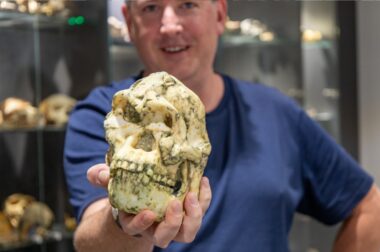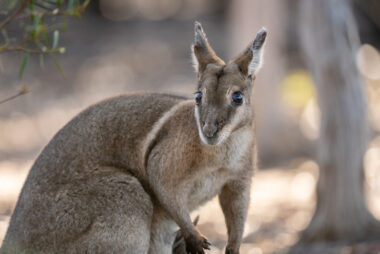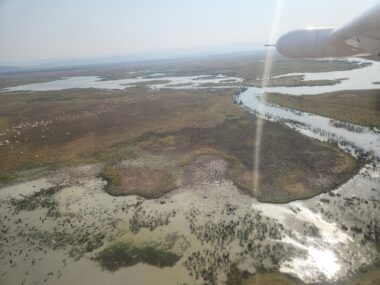Thursday 30 November: The AFAC, the National Council for fire and emergency services, has released its seasonal bushfire outlook, where the area of increased fire risk has increased from spring, and now includes all of far north Queensland and northern NSW, including areas that burned during the 2019-20 Black Summer fires.
Included in the AFAC outlook, is key information from the Australian Bureau of Meteorology official summer outlook for 2023/24, which coincides with the first day of summer tomorrow.
Some key points to note:
- Factors, including abundant vegetation growth and warmer than average temperatures are driving increased risk of fire for large areas of Queensland, NSW, and NT, as well as locations in Tasmania, Victoria, SA and WA.
- For almost all of Australia, maximum temperatures are very likely (80% chance) to be above median.
- With the approach of the summer months, the long-range outlook for likely low rainfall has eased across eastern Australia outside of the tropics, with models now showing the possibility of more rainfall for these regions than indicated in earlier forecasts. Though the north and west of Australia remain likely to have unusually low rainfall.
The following experts including doctors, firefighters and farmers are available to comment on the unseasonable heat and bushfire risk.
BUSHFIRE RISK
Dr Barry Traill AM, is a rural firefighter in south-east Queensland and member of Bushfire Survivors for Climate Action. Barry has been an active volunteer firefighter for over 8 years, and is Chair of his local brigade. He is also an ecologist by training, who grew up in Victorian forests, and he has particular expertise on fire in Australia. Barry can talk from personal experience in recent weeks on how disastrous the fire season has been so far in Queensland. He can articulate the heightened fire risks resulting from warmer and drier conditions during El Niño events super charged by climate change, and discuss the escalating impact of frequent bushfires on rural people and wildlife. Location: Sunshine Coast, Queensland.
Lucy Graham - Director - Cairns and Far North Environment Centre Inc. (CAFNEC)
As the director of CAFNEC, Lucy is engaged with community and environment groups throughout Far Nth QLD who are on the front line of climate impacts, calling for change and implementing on ground solutions. Location - Cairns
Innes Larkin, Mount Barney Lodge, for two generations, the Larkin family has owned and operated Mt Barney Lodge, an ecotourism retreat situated in the Scenic Rim. Innes has experienced compounding climate impacts in the region; Larkins tourism business has had to close on several occasions in the past five years due to extreme weather events. Location: Scenic Rim, QLD
Jo Dodds president Bushfire Survivors for Climate Action (BSCA), home community of Tathra was devastated by fires in 2018. Jo can speak about the concerns they have about an El Niño weather system, and the urgent action required by governments to reduce Australia's greenhouse gas emissions. Location: Tathra, NSW
Bushfire Survivors for Climate Action CEO Serena Joyner, “Going into an El Niño summer is terrifying to communities like mine – especially as we know that climate change will mean summers like 2019/20 will become more common as global temperatures continue to climb. It is especially galling that as our communities and firefighters like my husband prepare to face potentially devastating fires this summer, our government continues to subsidise and approve the polluting fossil fuel projects that are fuelling climate change. Ultimately, the coal and gas industry profits while we pay the price.” Location: Blue Mountains, NSW
Darin Sullivan, Active Firefighter, former President of the Fire Brigade Employees’ Union and a professional firefighter with more than 35 years’ experience. Location: South Coast, NSW
Note, we have additional spokespeople in Northern NSW if interested.
QLD FARMERS
Pete Mailler, farmer, “As a farming business we are completely exposed to the weather. Anticipating an El Niño we have made conservative cropping choices this year. We’ve had a couple of good years and I’m grateful for those. It buys us some time but farming is definitely riskier now than when I started. We see those extreme events, we’re faster into drought, we’re faster into flood. Weather volatility is the hardest thing to manage. Warmer drier weather and huge fuel loads is a very concerning combination.” Location: Goondiwindi, Queensland
Mick Dan, owner of Good Harvest organic farm on the Sunshine Coast and former Organic Farmer of the Year. Mick can talk about the impacts of flooding on his farm, as well as the outlook for the agricultural sector. Location: Sunshine Coast, QLD.
HEALTH IMPACTS
Dr Kate Wylie, Doctors for the Environment Australia executive director and GP, can speak about the physical and mental health impacts of extreme weather and climate change. Dr Wylie can share practical tips for staying safe during a heatwave and can talk to the prospect of an El Niño declaration and the impact this could have on mental and physical health. Location: Adelaide, SA
Dr Kimberly Humphrey, Emergency physician and Harvard Climate and Health Fellow said: ‘’From exacerbating heart, lung, and kidney diseases to heightening heat stroke risks, the toll of extreme heat on human health is unfathomable. Vulnerable groups like the elderly, children, and the socially isolated will bear the brunt, along with outdoor workers and athletes. In this critical juncture, the sole lifeline to safeguard lives and our planet lies in an unwavering commitment to abandon fossil fuels without exception.” Location: Adelaide, SA
HOT WEATHER IN CITIES
Sebastian Crangle, Home Energy Advisor, supporting households to reduce their home’s energy demands, whilst improving thermal comfort. He is accredited as an assessor with the Residential Scorecard program and works as a contractor to state governments. Location: Tweed Heads, Queensland.
Emma Bacon, Executive Director and Founder of Sweltering Cities, works directly with communities in Australia’s hottest suburbs, including the likes of Western Sydney, and Dandenong in South Eastern Melbourne and can provide insights and solutions on how best to prepare cities in the face of worsening extreme heat. Location: Usually Sydney, but in FNQ.
OCEANS
Ocean scientist Professor Gretta Pecl, from the Institute for Marine and Antarctic Studies and the Centre for Marine Socioecology at the University of Tasmania, authored the Australian ocean section of the latest IPCC report and can talk about the impact of heat on the ocean and in particular, the Great Southern Reef. Location: Hobart.
Contact details:
For interview requests, please contact Jemimah Taylor 0478 924 425 or [email protected]
After 3pm AEST, please contact Sean Kennedy on 0447 121 378 or [email protected]



